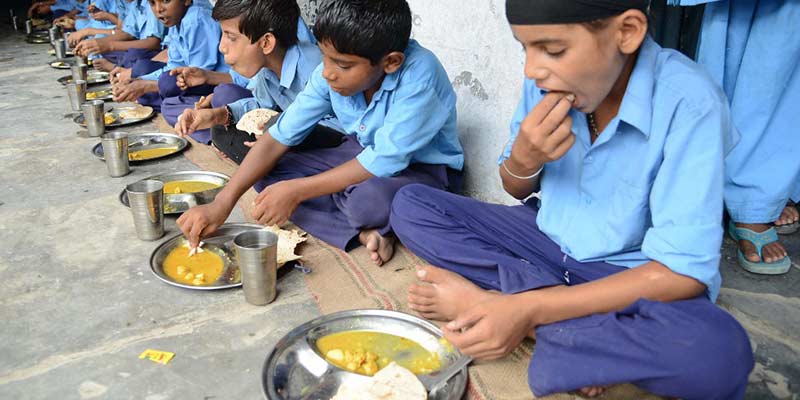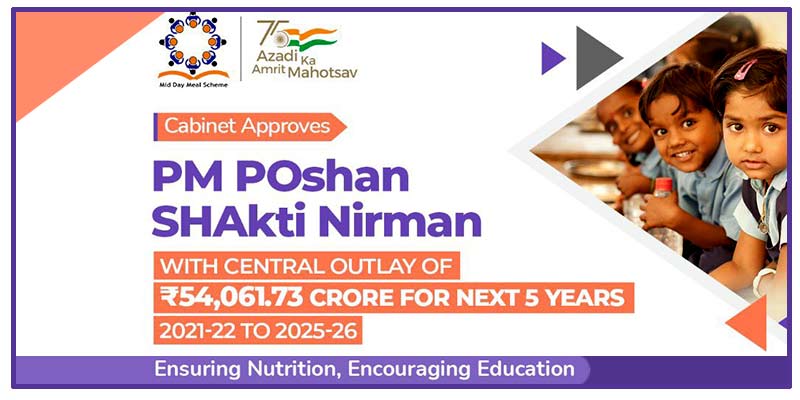- India
- Sep 30
Mid-Day Meal Scheme renamed as PM POSHAN
The national Mid-Day Meal Scheme in government and aided schools will now be known as PM POSHAN Scheme and will also cover students of pre-primary classes.
What is Mid-Day Meal Scheme?
• Mid-day meals in schools have had a long history in India. In 1925, a mid-day meal programme was introduced for disadvantaged children in Madras Municipal Corporation. By mid-1980s, Gujarat, Kerala and Tamil Nadu and the UT of Pondicherry had universalised a mid-day meal programme with their own resources for children studying at the primary stage.
• By 1990-91, as many as 12 states were implementing the mid-day meal programme with their own resources.
• With a view to enhancing enrollment, retention and attendance and simultaneously improving nutritional levels among children, the National Programme of Nutritional Support to Primary Education (NP-NSPE) was launched as a centrally sponsored scheme on August 15, 1995.
• Initially, it was launched in 2,408 blocks. By the year 1997-98, the NP-NSPE was introduced in all blocks of the country.
Objectives of the Mid-Day Meal Scheme are:
• Improving the nutritional status of children in Classes 1-8.
• Encouraging poor children, belonging to disadvantaged sections, to attend school more regularly and help them concentrate on classroom activities.
• Providing nutritional support to children of elementary stage in drought-affected areas during summer vacation.
• The Mid-Day Meal Scheme had become instrumental in improving enrollments in schools.
What is the revised PM POSHAN Scheme?
• The Cabinet Committee on Economic Affairs (CCEA) chaired by Prime Minister Narendra Modi cleared the PM POSHAN (POshan SHakti Nirman) Scheme for providing one hot cooked meal in government and government-aided schools from 2021-22 to 2025-26.
• This is a centrally-sponsored scheme.
• This scheme already benefits about 11.80 crore children studying in 11.20 lakh schools.
• Under the revised scheme, mid-day meals have been extended to students studying in pre-primary or balvatikas. Around 24 lakh students receiving pre-primary education at government and government-aided schools will be covered under the scheme.
• The CCEA has approved the continuation of the national scheme with the financial outlay of Rs 54,061.73 crore from the central government and Rs 31,733.17 crore from state governments and Union Territory administrations.
• Central government will also bear an additional cost of about Rs 45,000 crore on food grains. Therefore, the total scheme budget will amount to Rs 130,794.90 crore.
Other new features of the scheme:
• The concept of ‘Tithi Bhojan’ will be encouraged extensively. ‘Tithi Bhojan’ is a community participation programme in which people provide special food to children on special occasions and festivals.
• Government is promoting development of ‘School Nutrition Gardens’ in schools to give children first-hand experience with nature and gardening. The harvest of these gardens is used in the scheme providing additional micro nutrients. School Nutrition Gardens have already been developed in more than 3 lakh schools.
• While social audit of the scheme is made mandatory in all the districts, special provision is made for providing supplementary nutrition items to children in aspirational districts and districts with high prevalence of anemia.
• Cooking competitions will be encouraged at all levels right from village level to national level to promote ethnic cuisine and innovative menus based on locally available ingredients and vegetables.
• Involvement of Farmers Producer Organizations (FPO) and Women Self Help Groups in implementation of the scheme will be encouraged. Use of locally grown traditional food items for a fillip to local economic growth will be encouraged.
• Field visits for progress monitoring and inspections will be facilitated for students of eminent universities and institutions and also trainee teachers of Regional Institutes of Educations (RIE) and District Institutes of Education and Training (DIET).
Manorama Yearbook app is now available on Google Play Store and iOS App Store


